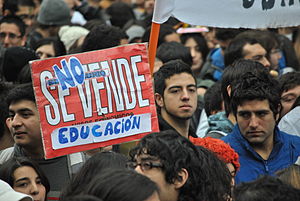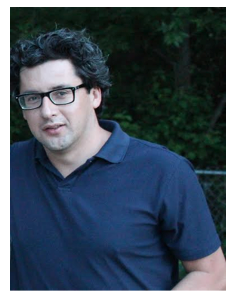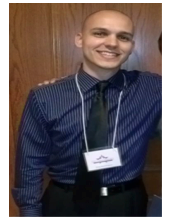WE NEED YOUR HELP! Do you believe in public education? Do you want US policymakers to understand why decision makers in Chile have now judged vouchers to be problematic after 30 years of universal implementation? Do you have frequent flier miles you can donate? Sponsor a grad student today!
This summer, I along with eight UT-Austin graduate students will travel to Santiago, Chile in August 2014 with Professor Julian Vasquez Heilig to conduct field research that will result in a policy brief, op-eds and a peer-reviewed academic paper detailing recent changes in Chile’s market-based education policy proposed this past April by Chile’s current Education Minister Nicholas Eyzaguirre.
Background: A Seachange for Voucher Policy
After two years of intense student protests, Minister Eyzaguirre indicated that current President Michelle Bachelet’s administration will propose an overhaul of the education system. The student movement in Chile has demanded regulation of the market-driven Chilean educational system and the strengthening of public education, but it is unclear why and how these transformations are going to take place. Our research seeks to understand and derive lessons from the process and implementation of Chilean educational reform.

Chile’s three decades of implementation and very recent pull back from vouchers can help inform U.S. educational
policymakers as vouchers— an old idea once used to fight desegregation in the US South— are once again gaining prominence in the U.S. educational policy discourse. Currently, there are no less than 22 conventional voucher programs in operation across 14 states (including D.C.), and another 16 neo-voucher programs across six additional states (38 programs in 20 states). The most profiled and studied programs were implemented in Florida, Ohio, New York City, and Washington, D.C.
The evidence on the efficacy of voucher is clearly underwhelming the U.S. and international contexts. In fact, we have 30 years of empirical evidence on how universal voucher markets actually function from Chile. School vouchers “cream” and “crop” students, do not lead to increased achievement but instead exacerbate societal inequalities, and also demonstration that competition for enrollment benefits private-voucher schools at the expense of public schools.
This research seeks to illuminate for Texans and the broader nation whether Chilean policymakers are responding to the several decades of research in Chile that has found that the voucher system stratifies students by ability, socioeconomic status and behavior (NEA, 2014). We also seek to include in several products (policy brief, op-eds and a peer-review research paper) the voice of Chilean policymakers voice on whether their assessment after 30 years of vouchers is that the market-based policy works only for a privileged minority at the expense of the many. The research group aims to have the products edited and prepared for dissemination and release to the public by the 83rd Texas Legislative session.
Help us produce this important research by sponsoring a student with frequent flier miles! You can also donate a ticket by using cash if you so choose (An airline ticket to Chile costs about $1,000 from Texas). UPDATE: 30,000 miles will book half of a ticket for airlines that allow one-way miles tickets such as American and United. So far three members of our team are funded but we need some help getting airline tickets for the rest of us. It takes 60,000 frequent flier miles to fly from Texas to Chile. Thus, if you want to:
- Help US policymakers to understand why vouchers were problematic after several decades of universal implementation. (Why wait ten years or more like we did with NCLB?)
- Support the development of scholarship that the Walton Foundation, Arnold Foundation, Broad Foundation and ALEC etc. would definitely not fund!
- Support the development of young scholars who will continue to fight for public education.
Email your pledge and contact information to Sarah Ishmael at sa.ishmael@gmail.com
Meet the Research Team

Alvaro Quezada Hofflinger was born in Victoria, Región de la Araucanía, Chile
Alvaro’s professional interest in educational policy and equity can be traced to his formative years growing up in a rural community in Chile’s poorest region. Educated under a system where almost half of the students attended private-voucher schools, he experienced first hand the many challenges brought on by the privatization of the educational system and witnessed its implications in terms of educational inequality. He obtained his Bachelors Degree in Psychology from the Universidad de la Frontera in 2002. From 2002 to 2006 I worked for the Chilean Ministry of Education and at the Center for Development and Research on Education in Santiago de Chile (CIDE). In 2006, he received the Ford Foundation Fellowship that allowed me to study a Master in Latin American Studies at the University of Texas at Austin. Currently he is a PhD candidate at LBJ school of Public Affairs (UT-Austin). His main research interests center on exploring the complex relationship between education, economic growth, and income inequality. His dissertation studies the unintended consequences of the introduction of competition and test-based accountability system in the Chilean educational system. Particularly, the impact of increased competition on socioeconomic segregation of students as well as how school use non-academic strategies, such as the exclusion of low-achievement students from the test-taking pool, in order to improve their performance on standardized tests.
Why Chile?
He is interested in this study because he believes it is relevant to understand how the student movement and civil society have impacted the political agenda of the current Chilean government. The student movement has demanded regulation of the market-driven Chilean educational system and the strengthening of public education, but it is unclear how these transformations are going to take place. This research seeks to understand key aspects of the policy process and policy implementation of the Chilean educational reform. There are lessons to be learned from the Chilean experience, not only for countries in Latin America, but also for policymakers in the U.S.

Joanna D. Sánchez is a PhD student in the Education Policy and Planning Program at UT-Austin. She is originally from the Rio Grande Valley (Pharr, TX). Joanna is a low-income, first-generation Latina who is passionate about excellent public education access for all, because she knows firsthand the difference it plays in influencing a student’s trajectory.
Why Chile?
Chile’s educational policy history and the shifts the country is currently experiencing will shed light on what it takes to defeat a voucher system. This knowledge is timely for us and anyone who believes our public education system should not only be just and equitable, but is in need of reinvestment not cuts. Joanna is fluent in Spanish, hard-working and determined to succeed, but more importantly, she is grounded and thankful for all the support she has received along her journey.

Anthony Vincent LeClair is a doctoral student in the Educational Policy & Planning Program within the Department of Educational Administration at the University of Texas. He spent five years as an English & philosophy teacher, and varsity baseball coach at the secondary level in urban Texas schools. Interested in the education landscape in Texas, he has spent the last eight years mapping out, navigating and working in each of the most pertinent spaces: the Texas State Legislature, a respected child and economic advocacy and policy center, urban Texas schools, and the university. His research interests include navigating school choice networks, racial and economic segregation in urban schools, and policy implementation.
Why Chile?
Over the last several years, A.V. has worked on a number of publications dealing with vouchers and school choice. His interest in studying neoliberal reforms and resistance to these policies that are having a negative affect on racial and economic integration, further exacerbating segregation, is why he is dedicated to this current research project. Though the U.S. has been experimenting with various voucher programs over the last several decades, studying Chile’s national system allows us to draw much greater parallels with potential large scale adoptions in the U.S.

Sarah Ishmael is first generation American woman of Afro-Caribbean heritage. A military brat, she spent most of her formative years in the great Pacific Northwest where she earned a B.A. from the Fairhaven College of Interdisciplinary Studies at Western Washington University.Currently, Sarah is a second year M.Ed. student in the Education Planning and Policy program at the University of Texas at Austin. Prior to her graduate studies, she completed the Teach For America program in Baton Rouge, Louisiana. She taught elementary and middle school for three years. Her research interests include policy implementation, Critical Race Theory, social justice in education, and relationships between political bodies, schools, and community stakeholders.
Why Chile?
Her passion for this research project is grounded in her dedication to social justice and anti-oppression work. The current trend of education reform focuses on defunding and closing public schools in the name of providing “choice” for minority and low-income students. Co-opting civil rights and social justice language, private philanthropists and state legislators try to make the case that free market education reform policies such as sanction-based accountability, private school vouchers and school turnaround strategies will result in a more just education system. Sarah feels that Chile serves an example of how, in truth, these policies tear apart the public education system, defund public schools and allow the more socioeconomically stable families to benefit from such policies while trapping low-income and minority students in defunded, destabilized schools. She believes that there is much policymakers in the U.S. can learn from the student movement in Chile. The student movement calls for reinvestment in public education and the regulation of almost privatized education system. This research is key to understanding how these policy changes will take place. She looks forward to respectfully partnering with and learning from policy makers and student leaders in Chile.

Sarah Ann Taylor is a second year M.Ed. student at the University of Texas at Austin and an educational consultant with FranklinCovey. She completed her undergraduate work as a North Carolina Teaching Fellow at the University of North Carolina at Chapel Hill, earning a B.A. in Elementary Education. Prior to beginning graduate school, she served as a classroom teacher and STEM coordinator in North Carolina’s largest district, the Wake County Public School System. She counts her teacher preparation program at UNC- Chapel Hill and her experiences teaching at A.B. Combs Elementary, recently named the #1 Magnet School in America, as integral to her commitment to developing more equitable education policies and to building intentional relationships every step of the way. Sarah Ann lives in Austin, Texas and loves reading, being on the water, traveling, and dancing alongside a live band! She is a college sports enthusiast and especially loves cheering on the Tar Heels and the Longhorns!
Why Chile?
As a social justice advocate, Sarah Ann believes this research has the potential to catalyze greater than ever support for more equitable public schools and to transform obstacles to opportunities by challenging government-sponsored vouchers. She looks forward to synergizing with her colleagues from the University of Texas and learning from stakeholders in Chile to promote protect children across the United States from being disadvantaged by discriminatory policies.

Greg is a second year student in the Educational Policy and Planning Masters Program at the University of Texas at Austin. He earned a Bachelors of Science in Mathematics at the University of Texas at San Antonio, in his beloved hometown, where he also received his secondary mathematics certification. Greg then taught high school mathematics to impoverished urban students in Edgewood ISD and Northside ISD in San Antonio, Texas (almost entirely Latino) for a total of five years. His research interests include the nexus of education policy, urban policy, community development, Latino/Xicano studies, and especially in the development and funding of zero to three early childhood education programs. His family, faith, Xicanismo, life experience (having come out of poverty in most aspects) and passion for social justice and the development of youth have driven him along the way through his continuing education and his work in and for public schools. Having seen and experienced the overwhelming challenges from outside the classroom from all directions, he left the classroom to find out what he could do to improve public education for the sake of the students. However, having to leave the classroom, he feels a sting of defeat and of unfinished business. His current studies are preparing him for the fight.
Why Chile?
Greg’s purpose for the research trip to Chile is to further his understanding on a deeper level on the effects of the privatization of education on a national level. With the rise of charters in the nation, Texas, and especially in San Antonio (even heavily amongst Latino children), this conversation has become even more important to him than before. And with such a strong push for the privatization of public education in our nation, this has become a very crucial piece of his studies.

Brandy Alexander is a 2nd year M.Ed. candidate in the Education Policy and Programming at the University of Texas in Austin. A former elementary education teacher, she taught for 8 years in the Houston area. Her passions include empowering the voices of teachers, parents, and students in public education settings to create effective policies that foster successful and healthy learning environments for all children. Last semester her focuses included the Parent Opt-Out movement, value-added teacher evaluation models, and teacher incentive programs.
Why Chile?
She is excited to be involved in this project with Chile because their experience with the nationalized voucher program should be a cautionary tale to the US. Communication with this country’s education leaders is extremely valuable as voucher programs are currently rising in popularity in the United Stares but continue to perpetuate inequalities in the public education system. She believes that while voucher programs are sold to communities as a way to empower parents and provide students with a better educational experience, Chile proves that much more research is needed in this area. She believes we need to learn more about voucher programs before we fund them over our public schools.

Stephanie Cerda has experience teaching multiple content areas from kindergarten to early college. She recently received a M.Ed from the University of Texas in Educational Administration. Stephanie plans to continue her work to thoughtfully implement and integrate technology into curriculum while striving for equity and successful learning outcomes for all students in her current position as an Innovative Teaching Strategist for Manor ISD. Her work and interests concentrate on transforming traditional public school structures with a deliberate focus on innovation, excellence, equity, and justice.
Why Chile?
Stephanie is excited to serve the research team as a translator with a keen interest in combatting educational inequality. She believes that studying Chile’s recent shift from vouchers to reinvestment in public education is important in advocating for an equitable education system in the United States.
Can you help us make this happen!? Please donate 60,000 frequent flier miles today or cash for a roundtrip ticket for one of these deserving students. Email your pledge and contact information to Sarah Ishmael at sa.ishmael@gmail.com
Please Facebook Like, Tweet, etc below and/or reblog to share this discussion with others.

3 thoughts on “Sponsor a Student!: Inform Your Policymaker Why Vouchers Have Failed”